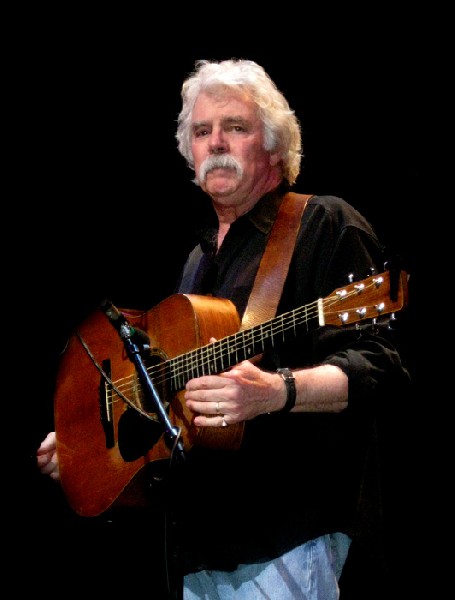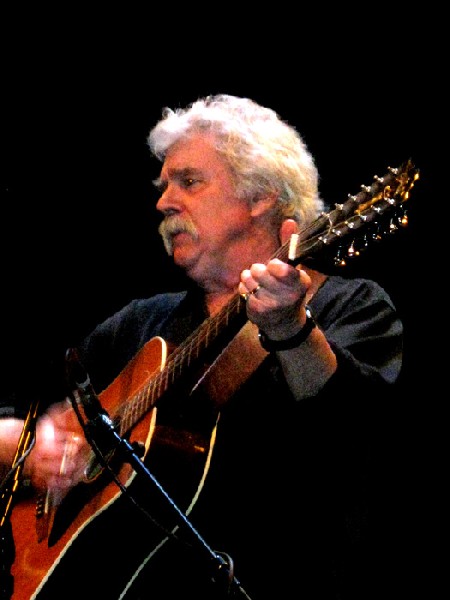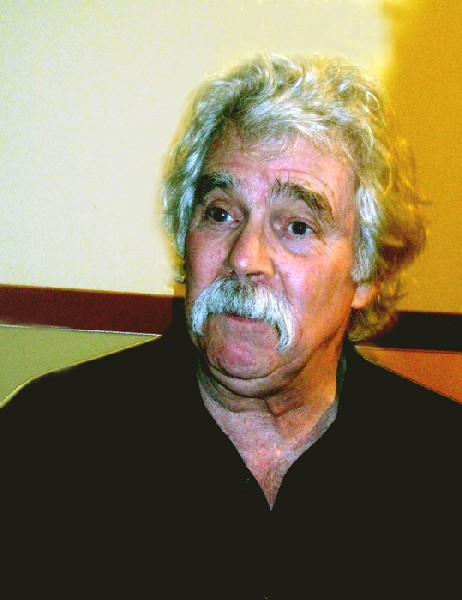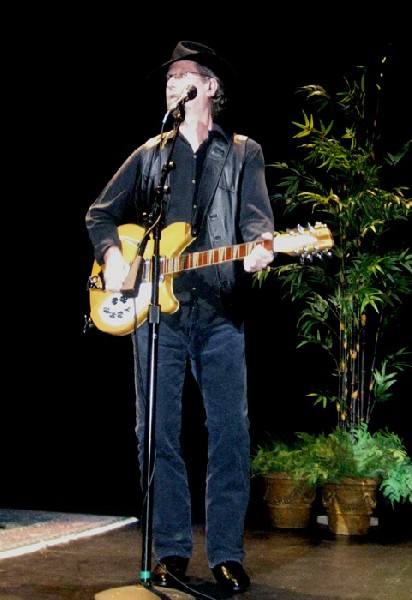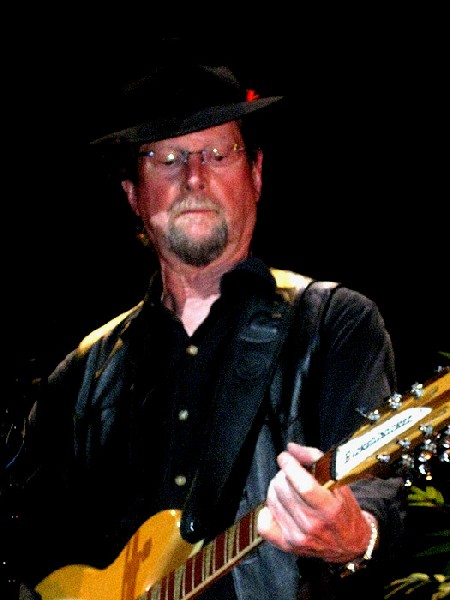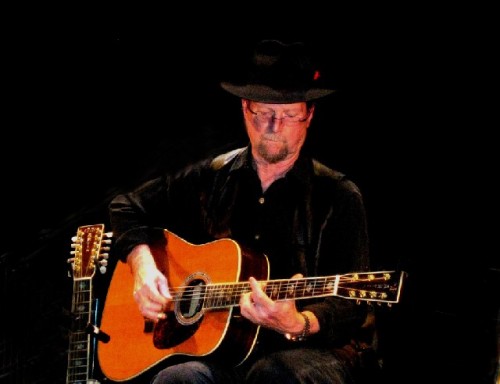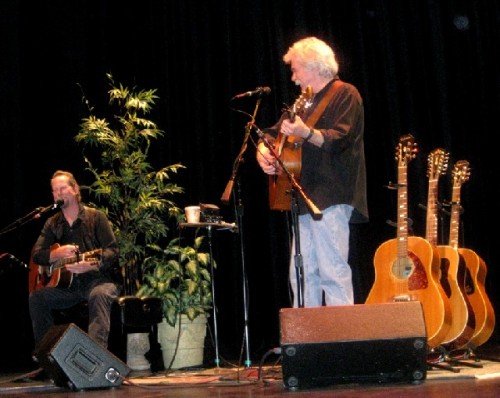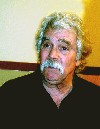Tom Rush and Roger McGuinn at the Colonial
Enchanting Concert by Singer/ Songwriters
By: Charles Giuliano - Mar 29, 2010
During his set at the Colonial Theatre in Pittsfield Tom Rush commented that it was his first visit to a "beautiful room." Judging by the warm reception to a superb and engaging performance, and a nearly full house, we anticipate many happy returns.Rush is on the road in support of his first studio album in 35 years. The CD "What I Know" was celebrated as "Folk Album of the Year" by the International Folk Alliance in Memphis. A video of "The Remember Song" humorously conveying a senior moment, Rush is now 68, has gone viral with 4 million plays on You Tube.
He was joined by Roger McGuinn the front man and founder of the iconic 1960s folk rock band The Byrds. We were regaled with a 90 minute set which chronicled the history of folk music, how the Beatles set folk chords to a rock beat, the birth of folk rock, and the inflection of other influences from Bach cantatas, to the ragas of Ravi Shankar and the free jazz of John Coltrane. The set climaxed with a generous dose of Byrd hits performed solo. Later he returned to join Rush for a duet, departed, then returned with Rush to close out the show with a refrain that left the audience stomping, happy and clamoring for more. At three hours it was a long but engrossing experience.
The charming and exhilarating evening evoked a personal skip down memory lane. The Byrds were among my all time favorite rock groups starting with their hit Dylan cover of "Mr. Tambourine Man." McGuinn explained and demonstrated the signature jingle jangle twelve string guitar intro. I recall seeing Tom back in the day at the Club 47 in Cambridge. He would wonder over from his Harvard dorm to play a gig or sit in for a set.
The one and only time I saw the Byrds was on the field as a reporter at Yankee Stadium for Sound Blast '66. What a show. It opened with the Cowsills, Jerry Butler, The McCoys, followed by the Byrds. Then they literally dragged Little Stevie Wonder off stage. He exited tooting harmonica in endless choruses of Up Tight Outtah Sight. They had to set up the stage to close with Ray Charles. I recall the Byrds crossing the infield to a standing O to take the stage. David Crosby, who seemed so small in the stadium setting, wore a groovy poncho. He preached between songs while McGuinn stuck to the music.
Before the show Tom was in the lobby signing CDs. At first I didn't recognize him. The initial reaction was that senior citizen sure looks like Tom Rush. Back in the day he had heart throb, Robert Redford looks. I had known him from when I worked at Sandy's in Beverly and Tom would do warm up gigs before tours. Later, Rush did a series of annual shows at Symphony Hall and I interviewed him for those gigs.
There's been a lot of water under the bridge since them days. I introduced myself. It was nice when Tom said "I thought I recognized you." He has always been such a charming and gracious dude and that was shared with the audience. He has elided gracefully from stud muffin to elder statesman. He told the audience of being a grandfather but cutting out the middle man. There were charming stories of his ten year old daughter with "My Bride" naturalist Renee Askins the author of "Shadow Mountain: A Memoir of Wolves, a Woman and the Wild." They lived in Wyoming for a number of years while she was involved in reintroducing timber wolves to the wild.
The project has been such a success that Tom told us "There has been a 23 % increase in lawyers."
"Trying to teach my daughter the value of money I gave her ten dollars as an allowance," he said. He wondered how she would spend it until "She offered to pay me six dollars to clean her room. I took it. I needed the money."
Still tall, thin, and angular, with glasses and a black cowboy hat McGuinn opened on electric guitar with a classic Byrds/ Dylan song "My Back Pages." The refrain "We were so much older then I'm younger than that now" has become particularly significant.
He moved from the mike stand to a piano bench surrounded with an array of instruments including acoustic twelve string, six string guitars, and a five string banjo. During the set he changed instruments between songs explaining their use and function. He was also meticulous about tuning commenting "because I care."
McGuinn conducted a clinic on the origins of folk music going back to the 1lth century. He speculated on whether folk music influenced classic composers or if classical composers influenced folk music. He got the audience involved by rehearsing us to sing along on choruses. He talked about the traditions of sea shanties and work songs. Later he observed that these were the folk traditions that the Beatles grew up with in Liverpool. He demonstrated by playing the folkie chord changes on "I Want To Hold Your Hand." It evoked knowing smiles. Arguably, it is why audiences so easily connected to those infectious, catchy, hook laiden early Beatles songs.
Performing in the Village he described bombing when he put a rock beat to folk music. There was a similar reaction when he played at the Troubador in LA. But Gene Clark liked what he was doing and they started writing songs together. "We were back stage at the Troubador when David Crosby was there and started singing harmony. He begged us to join the group." That was the birth of the Byrds. It wasn't always easy.
As McGuinn conveyed when he performed the sarcastic anthem "So You Want to Be a Rock and Roll Star.". His life and career seem to have come full circle. He described early years as a backup musician, session man, and solo folk performer in New York and later at the Troubadour in LA. Now reinvented as a solo artist and raconteur. What emerged during the long and varied set was his superb musicianship as well as inventiveness. It was fascinating when he explained and demonstrated how he had drawn on such a vast range of music. How a Bach cantata provided the changes that opened "Mr. Tambourine Man" or how Pete Seeger's banjo playing had been adapted for the hit arrangement of "Turn, Turn. Turn" with its lines adapted from Ecclesiastes.
Not discussed were the ego trips, legal disputes and personnel changes during the run of the Byrds. The original members were McGuinn (originally Jim then Roger), Gene Clark, guitar, harmonica, vocals, David Crosby, guitar, bass, vocals, Chris Hillman, bass, guitar, mandolin, vocals, and Michael Clarke, drums. When Crosby left to join with Stills and Nash, and Gram Parsons joined in 1968, he influenced the band in a new direction that resulted in the first country rock album "Sweetheart of the Rodeo." Hillman and Parsons left to form the Flying Burrito Brothers.
Opening his set Tom graciously observed that Roger was a hard act to follow. "Gosh, Roger's got so many hits and I've got to follow that."
There were similarities and differences in their approach. Where McGuinn is a teacher and preacher, Rush proved to be a laid back, engaging, self-effacing story teller. When McGuinn performed we were knocked out by his playing and touched by that reedy oh so recognizable vocal quality. One sensed the importance of the arrangement and musicianship. Tom, in the best folk tradition, told us stories. The songs were filled with rich nuances that touched us deeply with their humanity. With McGuin the music prevailed while Rush focused on the lyrics. He conveyed that by informing us that he had been an English major at Harvard. He was the first of the many singer/ songwriters of the 1960s. He discovered and record his peers starting with Joni Mitchell.
Most of us envy the glamour of successful musicians and their life on the road. But he revealed some of the dark side. Like a moment of despair and loneliness when he was on the bill in a big multi act rock show. "There was this huge cement area in the basement of a sport arena which was set up as a dressing room. There were hanging tarps creating cubicles. I was in mine feeling suicidal when I heard something next to me. It was B.B. King rehearsing with Joni Mitchell and teaching her to sing 'The Thrill Is Gone.' That brought me out of my funk." He followed with a humorous and richly inflected version of "Making the Most of a Bad Situation."
Early in the set he introduced material from the new CD "What I Know" starting with "Fell into Night." There was a dialogue on the conundrum of 35 years between studio albums. He didn't want to "rush into it." It seems he thought that like most poets he would die young and go out in a blaze of glory. That didn't happen and at some point you have to change the game plan. This slid into Jackson Brown's "These Days."
Usually the Dobie Gray song "Drift Away" gets a big production 'With horns, laser lights and pole dancers." But he scaled it down effectively. Giving booming emphasis to the percussive aspects of the lyrics and their sing along anthems.
"Oh, give me the beat, boys, and free my soul
I wanna get lost in your rock and roll and drift away
Oh, give me the beat, boys, and free my soul
I wanna get lost in your rock and roll and drift away"
There were ballads from the classic album "Ladies Love Outlaws." Now, as a remarried "grandfather," those love songs take on a different dimension. There was the resonance and poignancy of life experience so wonderfully conveyed in the hilarious but oh so easy to identify with "The Remember Song." No wonder it went viral on You Tube.
He confessed to daily checking in on the staggering number of visits to his clip. To his dismay he reported that a video of an elephant burping was catching up to him. Oh well, so much for fifteen minutes of fame and after decades becoming an "overnight sensation."
With some nostalgia he recalled his early musical education at the Club 47. "Part of what they did was to bring in the old timers of so many musical genres from Blue Grass to Blues. In many cases they got guys out of retirement. The room was so small that one could sit at the feet of legendary musicians. In some cases, on the feet of the musicians. I particularly liked hearing the blues guys because you could steal their chords. One of them was Sleepy John Estes. They called him that because he couldn't stay awake too long. He was always nodding off. "
A version of the John Prine song "Let's talk dirty in Hawaiian" brought the house down. He explained how a couple of mid westerners, Fred Koller and John Prine, had decided to write a song in a foreign language, one that they didn't understand. It resulted in the lyrics
"Let's talk dirty in Hawaiian
Whisper in my ear
Kicka pooka mok a wa wahini
Are the words I long to hear
Lay your coconut on my tiki
What the hecka mooka mooka dear
Let's talk dirty in Hawaiian
Say the words I long to hear"
Tom commented that performing the song resulted in a reprimand from the Boston Globe. Putting on a prissy, sour face he conveyed how "Rush has marred what was otherwise an enjoyable concert" by "making fun of Hawaiians." It prompted him to fire off a note to the critic that he wasn't making fun of Hawaiians, but making fun of mid westerners making fun f Hawaiians. Oh well. He also invited us to sing along on the chorus of "Kicka pooka mok a wa wahini." Nobody took him up on it.
He mentioned his CD a few more times and then said "Did I mention my new CD?" Let's hope he records another one soon. There was also personal stuff about growing up in New Hampshire. His father was a teacher at St. Paul's. When I knew him he was a New Hampshire farmer but there were all those years in Wyoming and California. Recently the family moved back to Hanover, New Hampshire. "Then across the river to Vermont" he said. "I just couldn't take another New Hampshire winter."
One great advantage for this show was that "Now I can drive to work." Which is why he was able to perform with four guitars rather than the one or two when traveling by plane. Let's hope that our New England neighbor mozies on down to Pittsfield again next year. If he can find his car keys. Take it easy Gramps until the next time.

